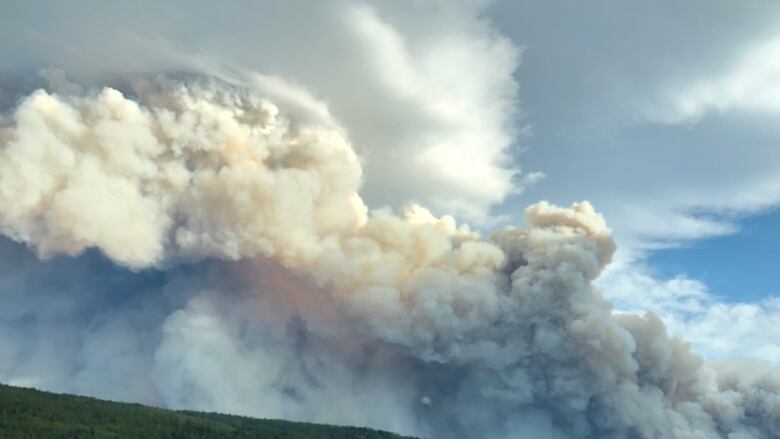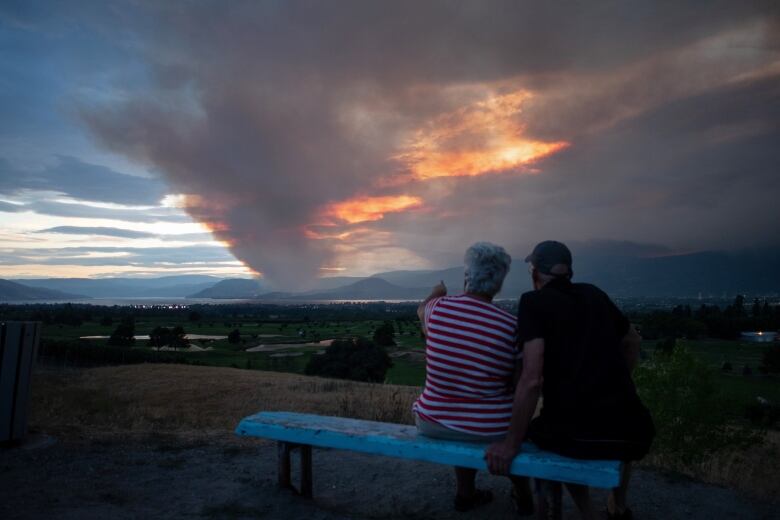What you need to know about B.C. wildfires for Aug. 17
Some evacuation alerts and orders rescinded after overnight rain helps firefighters on Tuesday

The latest on the wildfires:
- A shift in weather has led to several evacuation orders and alerts being rescinded.
- The Coquihalla Highway has now been reopened between Hope and Merritt after a day-long closure.
- Tourists are being urged to stay out of communities impacted by wildfires.
- Rain and cooler temperatures are in the forecast in coming days, which could be helpful for wildfire suppression efforts as long as wind remains calm.
- For a full list of evacuation orders and alerts, visitEmergency Information B.C.
Thousands of properties were under evacuation orderTuesday after 70 km/hwinds fanneddozens of wildfires across B.C.over the weekend.
As of Tuesday afternoon, there were 86evacuation orders and about 125 evacuation alerts in place.
However, a shift in the weather led to evacuation orders and alerts being rescinded in some areas, including some entire communities that were evacuated because ofthe White Rock Lake wildfire.
There are more than 260 active fires throughout the province, 31 of which areconsidered wildfires of concern.
The B.C.government has extended the provincial state of emergency through to the end of August, in order to better support those forced to flee their homes due to the wildfires.
The City of Kamloops, near many of the province's biggest wildfires, rescinded an evacuation alert that was in place for the western part of the city on Tuesday morning.
Residents of Cherry Creek were allowed to return home Tuesday evening, as 166 properties were downgraded from an evacuation order to an evacuation alert.
An evacuation order for the Okanagan Indian Band was partially downgraded to an alert on Tuesday afternoon.
CaribooRegional District board chairMargo Wagner said Tuesday on CBC's Daybreak Kamloops that there are only two properties in the Moose Valley area under evacuation order due to the Flat Lake wildfire near 100 Mile House.
On Sunday, hundreds fled their homes under smoke-filled orange skiesas evacuations were ordered in communities throughout the southern Interior.Others, however, chose to stay behind and try to protect their properties, which officials are condemning after 10 people had to be rescued by firefighters from the White Rock Lake fire on Sunday night.
CentralOkanaganEmergency Operations Centre director Brian Reardon said firefighters hadto bepulled away from controllingthe blaze and put in more dangerin order tosavepeople who deliberatelyignored evacuation orders.
"I think that [situation] speaks for itself. We really encourage people to gather your things and vacate the area to let the firefighters do their job. It's all about protecting lives,"Reardonsaid.
The White Rock Lake wildfire remains of great concern for firefighters and officials, and is currently 782square kilometres in size.
On Sunday, firefighters nearKilliney Beach on the west side of Okanagan Lakewere unable to safely leave the area because ofaggressive fire behaviour. Crews were pulled off the fire, and because they could not travel, had to shelter in place until routes became accessible.
Reardonsaid the district had estimated 70 properties in theEwings Landing and Killiney areas had been significantly damaged by the fire, with additional properties likely to be affected.
The B.C. Wildfire Service says they are searching for breaches in fire guards previously built to contain the flames followingrecent fire activity.
Poor visibility due tosmoke grounded fixed-wing aircraft on Monday, but helicopters were available to assist with suppression efforts.

The Sparks Lake fire now covers 954square kilometres, and is the largest wildfire burning in the province.
The Lytton fire complex, Tremont Creek, July Mountain andMckay Creek fires are alsoof "significant" concern, according toPublic Safety Minister Mike Farnworth.
Since April 1, more than 1,500 wildfires have been sparked throughout B.C., scorching8,250 square kilometres in total.
The 10-year average for the same period is 1,036 fires and about 2,000 square kilometres burned.
Thousands of personnel have joined the wildfire fighting efforts, including 500 people from out of province. Another 200 personnelare expected to arrive from other provinces this week.
Unclear how many properties damaged so far
Even as the Regional District of Central Okanagan confirms upwards of 70 properties have been lost to the White Rock Lake fire, other fires remain dangerously close to houses and residents.
There has also been "limited structural damage'' reported because of the MountLaw wildfire also burning in thedistrict, said Laura Wilsonwith the district.
"At this time, we still can't confirm that number,'' Wilson said. "We're just working with B.C. Wildfire in order to get into the area to kind of confirm those properties.''
During a press conference Monday, provincialofficials said it is unclear how many properties have been damaged or destroyed by wildfire so far this year.
Tourism discouraged
The Coquihalla Highway, that connects the southern Interior and Lower Mainland, has now reopened from Merritt to Hope after itwasclosedSunday night due to wildfires burning nearby.
On Monday, a mudslide triggered the closure of Highway 1 between Lytton and Cache Creek. The 80 kilometre stretch of road remains closed as of Tuesday afternoon.
DO NOT travel to areas affected by #BCWildfires for non-essential reasons.
People in those communities need to be able to evacuate, if needed, and access supports.
If you had plans, please change them. Instead, visit somewhere in BC your presence wont strain local resources. pic.twitter.com/nikni3Urg8
—@TranBCOfficials are urging tourists to stay away from areas impacted by wildfires.
"Now is not the time to be travelling to the Interior for non-essential travel," Farnworth said during a press conference Monday.
Thompson-Nicola Regional District emergency program co-ordinator Kevin Skrepnek said he is concerned how evacuees will be accommodated when highways are closed.
"Accommodation's an ongoing issue, especially if we start to see larger communities needing to move all at once," he said Tuesday to Doug Herbert, the guest host of CBC's Daybreak Kamloops.
The B.C. Wildfire Service has also askedpeople to stay away from areas affected by wildfires toensure access and safety forfirst responders.
Boaters are also being asked to avoid areas of OkanaganLake being used by air support.
OPEN #BCHwy5 - Now OPEN between #HopeBC and #Merritt. TRAVEL ADVISORY is in effect on the #Coquihalla due to wildfire activity. Essential travel only. No facilities available. No stopping. No access to on/off ramps. Watch for crews on the road. Watch for wildlife and debris. https://t.co/pUNqrabxv1
—@DriveBCCooler temperatures in the forecast
A cold front moved through B.C. Monday, bringing much needed rain and cooler temperatures.
"While we have a couple of days of cooler weather forecast right now, winds continue to be an issue for our crews, making fire behave very radically and actively," Wilson said.
Ty Boe and his wife Devon were evacuated from West Kelowna's Glenrosa neighbourhood on Sunday due to the Mount Law wildfire. He says he's hoping the fires will move in another direction.
"You never know because it's really dependent on the winds," Boe said Tuesday to Chris Walker, the host of CBC's Daybreak South. "The wind is the big thing."
Later this week dry conditions will return to the province, but temperatures are expected to remain below the seasonal average for the rest of the week.
"We did receive ample precipitation in the Kamloops Fire Centreand some in the southeast," said Erika Berg, a fire information officer with the B.C. Wildfire Service.
Berg said the rain was enough to lessen the activity of some of the most active wildfires in the region overnight on Tuesday.
However, the B.C. Wildfire Servicesaid theimpacts might be short-lived asdeeper layers in the ground are stilldry.
Environment Canada is predicting more showers in Kamloopsand Kelownathis weekend.
Officials say long-term forecasts show the rest of August will be cooler than it's been all summer. A "mixed-bag" of moisture is expected, though little precipitation is forecast to fall in coming weeks.
Anyoneplacedunderanevacuationordershouldleavetheareaimmediately.
Evacuationcentreshavebeensetupthroughouttheprovincetoassistanyoneevacuatingfrom acommunityunderthreatfrom awildfire.
Tofindthecentreclosesttoyou,visittheEmergencyManagementB.C.website.
Evacuees are encouraged to register withEmergencySupport Servicesonline, whether or not they access services at anevacuationcentre.
READ MORE:
- 'Let the firefighters do their job' says B.C. official after evacuees stay behind, putting lives at risk.
- Mayors, chief in B.C.'s Interior say they're disappointed at federal election callamid raging wildfires.
- Climate change is atop federal election issue for B.C. voters, poll finds.
- Property insurers areupdating theirrisk modellingas Canada braces for climate impacts.
Do you have a story to share?
If you've been affected by the B.C. wildfires and want to share your story, emailus atcbcnewsvancouver@cbc.ca.
With files from Brittany Roffel, Akshay Kulkarni, Courtney Dickson and The Canadian Press












_(720p).jpg)


 OFFICIAL HD MUSIC VIDEO.jpg)
.jpg)



























































































